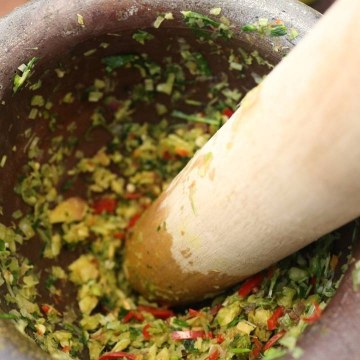
Blogs

How to Make Salad Dressings That Transform Your Meals
Gone are the days of the sad, limp salad—those lonely bowls filled with pale lettuce, sharp onion, and hard, underripe tomatoes. Today, salads are vibrant, diverse, and satisfying enough to take centre stage at the dinner table. Whether you’re eating light, reducing food waste, or boosting your fruit and veg intake, salads are a colourful canvas for creativity—and the right salad dressing brings it all together.

Thai food is popular all over the world, and the vast assortment of Thai curries are some of the most beloved. Usually served with steamed jasmine rice, yellow, green and red Thai curries can be cooked with all kinds of vegetables, meat or seafood. They’re so versatile that these pastes, made from fresh herbs, spices and aromatics can also be used to marinate, add to soups or give a flavour kick to noodles or rice dishes. The difference between each of these colourful curries may be confusing at first, but we’ll be running through their different core ingredients and flavour profiles to help you find your favourite!

Discovering the Rich Flavours and Traditions of Thai Food
Thai cuisine is one of the most celebrated culinary traditions in the world — and for good reason. Its vibrant flavours, artistic presentation, and deeply rooted cultural significance make Thai food both unforgettable and unique. While it shares core ingredients with other Southeast Asian neighbours — such as chilli, garlic, ginger, lemongrass, fish sauce, palm sugar, and lime juice — Thai food has carved out a flavour profile that is entirely its own.
The Heart of Thai Cooking: Balance and Harmony
At the heart of Thai cooking lies the principle of balance. Every Thai dish is a delicate and deliberate orchestration of sweet, sour, salty, and spicy elements. Rather than one taste dominating the dish, Thai cooks strive to ensure that each flavour note is present and in harmony. For instance, palm sugar may mellow the saltiness of fish sauce, while lime juice or tamarind adds acidity to brighten the overall flavour. Herbs such as lemongrass and galangal (a cousin of ginger) infuse dishes with aromatic depth, often softening the intensity of chillies or garlic.
The skill of a Thai chef lies not just in technique but in their intuitive sense of proportion — knowing how to balance sharp heat with cooling sweetness, or round out saltiness with citrus tang. This philosophy makes every dish feel dynamic and alive, awakening every part of your palate.

Making the Best Asian Stocks: The Secret to Incredible Soups, Stews, and Sauces
In the heart of every memorable bowl of pho, ramen, miso soup, or laksa lies a humble but mighty ingredient: stock. At Otao Kitchen, we believe that mastering the art of Asian stocks is essential for any aspiring home cook or chef. Whether you're whipping up a rich pork tonkotsu, a delicate seafood broth, or a nourishing chicken congee, a well-crafted stock is the foundation on which great flavour is built.
Having a good stock or broth is important in producing the best soups, stews, sauces and other dishes. It’s the foundation, or base layer, where you can begin to build flavour and umami. Obviously, making your own is time-consuming, but a quality homemade stock far surpasses a store-bought one.
In this article, we’ll explore everything you need to know about making traditional and Asian-style stocks – from choosing the right bones to understanding simmer times, aromatics, and insider tips from our Otao Kitchen masterclasses.

Herbs and Spices in Vietnamese Cooking: The Aromatic Soul of Every Dish
Vietnamese cuisine is renowned for its vibrant flavours, aromatic freshness, and harmonious balance. While many global cuisines rely heavily on fats or heavy sauces, Vietnamese cooking leans into herbs, spices, and aromatics to deliver depth and complexity. Whether you're exploring a warming bowl of pho, a crunchy banh xeo, or a zesty goi salad, you'll find that herbs and spices play a starring role—not just as garnishes, but as essential ingredients.
Why Herbs and Spices Matter in Vietnamese Food
Vietnamese cooking uses salt, sugar, pepper, garlic, and onion like most cuisines, but what sets it apart is its liberal use of fresh herbs. In many dishes, herbs act as vegetables—the base of soups, stir-fries, salads, and stews. The contrast between hot and cold, crunchy and tender, sweet and spicy is built from the ground up with these fresh, flavour-packed ingredients.

Vietnamese cuisine is one of the most diverse and vibrant in the world. It uses an enchanting mix of food from colonial visitors, native ingredients and traditional cooking techniques. Many aspects of climate, trade, history and immigration has influenced the food of Vietnam we know today.
